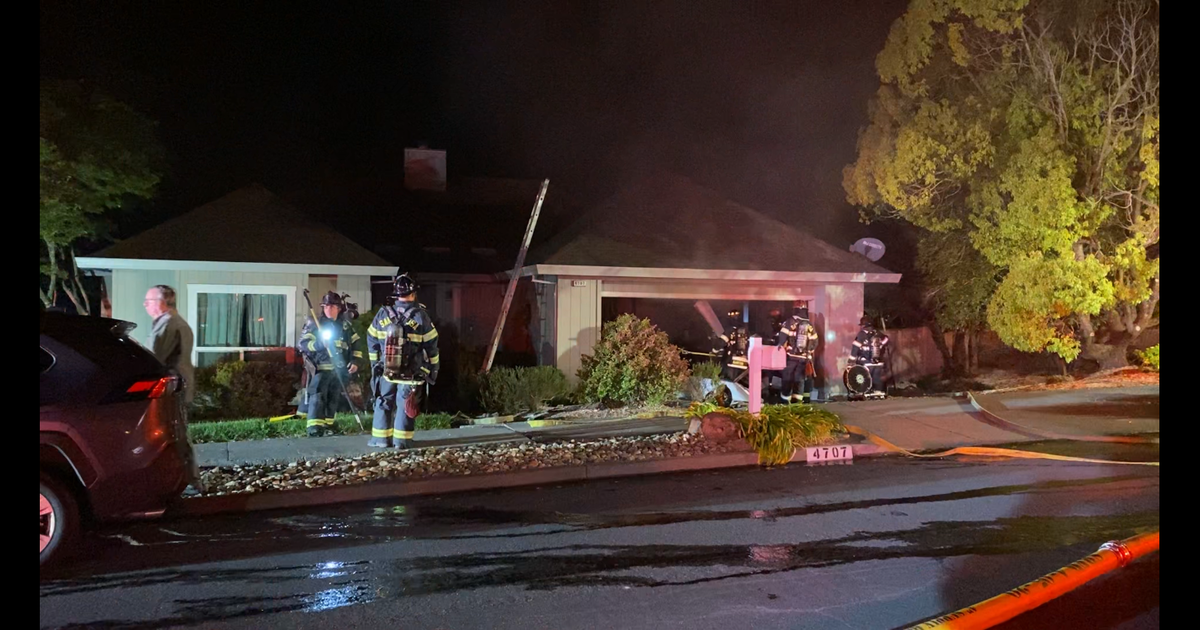Trump Tweets Mock Video Showing Him Tackling, Beating 'CNN' Opponent
BRIDGEWATER, N.J. (CBS/AP) -- President Donald Trump has tweeted a mock video that shows him pummeling a man in a business suit -- his face obscured by the CNN logo -- outside a wrestling ring.
It's not clear who produced the brief video, but it was posted from Trump's official Twitter account.
Trump's been stepping up verbal attacks on the media and cable networks particularly. But an adviser thinks "no one would perceive that as a threat. I hope they don't."
White House homeland security adviser Tom Bossert also told ABC that he thinks Trump has been "beaten up in a way on cable platforms that he has a right to respond to."
White House officials traveling with Trump during his weekend stay at his New Jersey golf club did not immediately respond to questions about who made the video or about any message the president might have intended to send.
The video appeared to be a doctored version of an appearance Trump made on a World Wrestling Entertainment Inc. show called "Battle of the Billionaires" in 2007, in which Trump appears to attack WWE CEO Vince McMahon.
McMahon's wife, Linda, who founded and built the company with her husband, now heads the Small Business Administration for Trump and was a generous benefactor to his campaign.
The video was posted several days ago by a Reddit user with the title, "Trump takes down fake news." It was not clear whether that was where it originated or where Trump found it. Still, the user wrote Sunday about being "honored" Trump had tweeted the video. The user who posted the video has a history of posts using anti-Muslim and anti-immigrant language.
A CNN spokesperson said Sunday: "It is a sad day when the president of the United States encourages violence against reporters. Clearly, Sarah Huckabee Sanders lied when she said the president had never done so."
White House spokeswoman Sarah Sanders said last week Trump "in no way, form or fashion has ever promoted or encouraged violence.""
Republican officials acknowledged Sunday that Trump's Twitter feed distracts from work like health care.
"We in Washington, we in the country, cannot be focused on tweets," said Sen. Bill Cassidy, R-La., adding that "I get so frustrated when we get focused on tweets."
Gov. John Kasich, R-Ohio, said he hoped Trump's family would talk to him and say, "Knock it off."
"The coarseness doesn't help anybody," he said.
Bossert and Kasich appeared on ABC's "This Week." Cassidy was on NBC's "Meet the Press."
MEDIA RESPONSE
A CNN spokesperson said that Trump: "is involved in juvenile behavior far below the dignity of his office. We will keep doing our jobs. He should start doing his."
The Reporters Committee for Freedom of the Press has condemned the tweet. Executive Director Bruce Brown called the post a "threat of physical violence against journalists."
Brown said the tweet was "beneath the office of the presidency," adding "no one should be threatened with physical harm for doing their jobs."
WOULD ANYONE ELSE BE FIRED?
Social media experts say that if President Donald Trump were anyone else, he'd be fired -- or at least reprimanded -- for his latest tweets.
And if he were to look for a job, experts say, these tweets would raise red flags for companies doing social media background checks, an increasingly common practice as tweets and Facebook posts become a daily, sometimes hourly part of our lives.
Of course, Trump is anything but typical.
Still, experts say it's a mistake to think that because the president is getting away with calling a man "Psycho Joe" and saying a woman was "bleeding badly from a face-lift" and had "low I.Q.," regular people would get away with it, too.
"Mr. Trump would be fired for his tweets of today, and nearly every day," said Mike Driehorst, a social media expert at the marketing agency Weaving Influence. "Most companies have a thin skin when it comes to public criticism and media reports."
Nannina Angioni, an employment attorney at the Los Angeles-based law firm Kaedian, said certain speech is protected, such as posts about a workplace grievance or organizing a union. But she said that if "you take to Twitter to call your boss a 'psycho' or say that your CEO has a 'low I.Q.' that could absolutely get you fired."
That applies even to chief executives.
"Any good outside crisis adviser would tell the company's board that they have no choice but to terminate the CEO," said Kara Alaimo, a public relations professor at Hofstra University in Hempstead, New York. "Today, more than ever before, citizens expect companies to espouse and uphold values."
PLENTY OF EXAMPLES
In 2013, Justine Sacco, a 30-year-old public-relations executive for the internet company IAC, tweeted, "Going to Africa. Hope I don't get AIDS. Just kidding. I'm white!" Though it was on a personal account with only 170 followers, the tweet quickly went viral. She didn't learn she had become a top "trending topic" - not in a good way - as her phone was off during an 11-hour flight to South Africa. She was fired, of course.
Earlier this year, the New York Post fired football writer Bart Hubbuch for comparing the president's inauguration to the 9/11 attacks. He has since deleted the tweet and apologized.
A month later, a preschool teacher in Texas lost her job over a series of anti-Semitic posts, including a tweet that said "kill some Jews." Nancy Salem had also retweeted: "How many Jews died in the Holocaust? Not enough!" according to a news report at the time. Salem later apologized.
BROAD RANGE OF POLICIES
What happens when workers send out crude, hateful or offensive tweets - especially if they fall in a gray area - can depend on where they work.
Many policies encourage common sense, such as refraining from posting private company information or speaking on behalf of the company unless authorized. Hate speech and offensive comments are also frowned upon.
"Customers, colleagues, supervisors, suppliers, competitors and others may have access to your posts," General Motors' policy states. "Offensive or inappropriate remarks are as out-of-place online as they are offline. Use the same set of standards as you do in the physical workplace."
Government agencies such as the General Services Administration prohibit "engaging in vulgar or abusive language, personal attacks of any kind, or offensive terms targeting individuals or groups." The White House didn't respond to requests for comment.
Coca Cola's policy, meanwhile, doesn't spell out that employees shouldn't harass others or post racist rants, yet such topics can be construed as falling under "common sense." The policy reads, "You are responsible for your actions. We encourage you to get online and have fun, but use sound judgment and common sense."
The computer chip maker Intel also trusts employees to use their own judgment.
"What do our policies mean? They mean that we trust you," the guidelines state. "We bring smart people into the Intel family and we expect you to make smart decisions."
But as Sacco, Hubbuch and Salem learned, with trust comes responsibility and if you tweet first and think later, you could face dire consequences.
TWITTER'S SIDE
Even before Thursday's tweets, there have been calls for Twitter to ban Trump from the service. The company's policies prohibit harassment, inciting harassment and "hateful conduct."
But there is a lot of wiggle room as to what constitutes such behavior. While Twitter doesn't comment on individual accounts, CEO Jack Dorsey told NBC that it's "really important to hear directly from leadership" to hold people accountable and have conversations out in the open, not behind closed doors.
Trump has also given Twitter a popularity boost, even if that hasn't exactly translated, at least not yet, to revenue growth.
GROWING SCRUTINY
As for the next job, Social Intelligence is one of a growing number of companies that screens social media accounts of prospective employees - similar to criminal background checks or credit reports.
Its president, Bianca Calhoun Lager, said the company has seen a "really big demand growth" since early 2016. Anecdotally, she said the attention on tweets and other social media during the 2016 elections may have contributed to the growth.
The company screens people's publicly available posts against a set of criteria such as potentially illegal or violent activity, or content that is sexually explicit, racist or intolerant. About 10 to 15 percent of the applicants screened get flagged, often for multiple incidents, suggesting a questionable post is more than a mistake.
Rather than wait for an employee to engage in conduct that can lead to firing, Lager said employers are increasingly protecting themselves from hiring people who might create a hostile workplace to begin with.
© Copyright 2017 The Associated Press. All Rights Reserved. This material may not be published, broadcast, rewritten or redistributed



